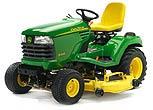The Lawnmower Man
Here’s a blast from the past. About five years ago, I published this story in Optometric Management, one of our trade rags that I contribute to now and then. “Mr. Skinner,” if you’re still out there driving that John Deere, keep on truckin’, but watch out for that…doh!…never mind.
——————————————————————————–
It seemed he’d helped me more than I’d helped him.
Mr. Skinner kept his independence through difficult circumstances. He was legally blind but he refused to let that take away his freedom of living.
Recently, he came to my office for his annual exam. The familiar tapping sound and a glimpse of his red-tipped cane made me recognize him immediately. He smiled and moved toward the exam chair, his head moving from side to side like a beacon scanning the night sky.
Man and machine
Large scars from wet, age-related macular degeneration had left him with 2/700 vision in each eye. But an extended stay in a blind rehabilitation center had enabled him to use his limited vision well.
Several years prior, Mr. Skinner had reluctantly turned over his Buick keys to his son, but not the keys to his John Deere.

“It’s not that hard to drive,” he deadpanned. I just cock my head to one side and let ‘er rip!”
Mr. Skinner’s tractor had a unique contraption to help him avoid his fence. The early warning system he designed consisted of a sawed-off broom handle mounted horizontally to the hood. A spring attached to the broom handle’s base. Whenever he got too close to his fence, the rod brushed against the cedar slats producing a “rat-a-tat” sound reminiscent of automatic weapons fire.
“There’s nothing wrong with my hearing,” he wryly explained.
Springtime
Mr. Skinner smiled as he boasted about his invention, with the pride that only a John Deere driver could truly understand. It was early spring, and he was pleased with how quickly his grass was growing.
“How straight are your cuts?” I asked.
“A little crooked,” he smiled. “But the grandchildren come along after I’m done and straighten things up.”
I dilated his eyes and moved in for a closer look. Deep, enormous macular scars filled the view of my condensing lens. Fluid was still visible beneath the sensory retina, pooling like the blackish backwater of a Louisiana swamp. I took special care during binocular indirect ophthalmoscopy–the precious slivers of vision afforded by his healthy peripheral retina demanded it.
I leaned back, offering some perfunctory words of assurance. “Everything seems the same.”
Sanctuary
He paused then and gazed at me, with a wistful look of contemplation.
“Doc,” he said, “I love to dream. When I dream, everything’s the way it used to be.”
His words stopped me cold. In twelve years of seeing patients, I’d never once considered that the blind receive temporary vacations from their sightlessness. Suddenly, I realized that there exists in the dark of the night a sanctuary of sight where blind spots fade away and the world comes alive with the colors, faces and sights of the past. How wonderful the nights must be, and how disappointing the dawn.
As he left the office, Mr. Skinner slapped me on the back and promised to “keep on truckin’.” I watched him leave, reflecting on the amazing grace with which he overcame his blindness.
After he was gone, I reached into my pocket and pulled out two quarters. I brought them close to my eyes, and began to walk around the room, my head scanning side to side. I saw the world through Mr. Skinner’s eyes and marveled at the view–freshly cut furrows of green springtime grass.

2 Comments
Comments are closed.